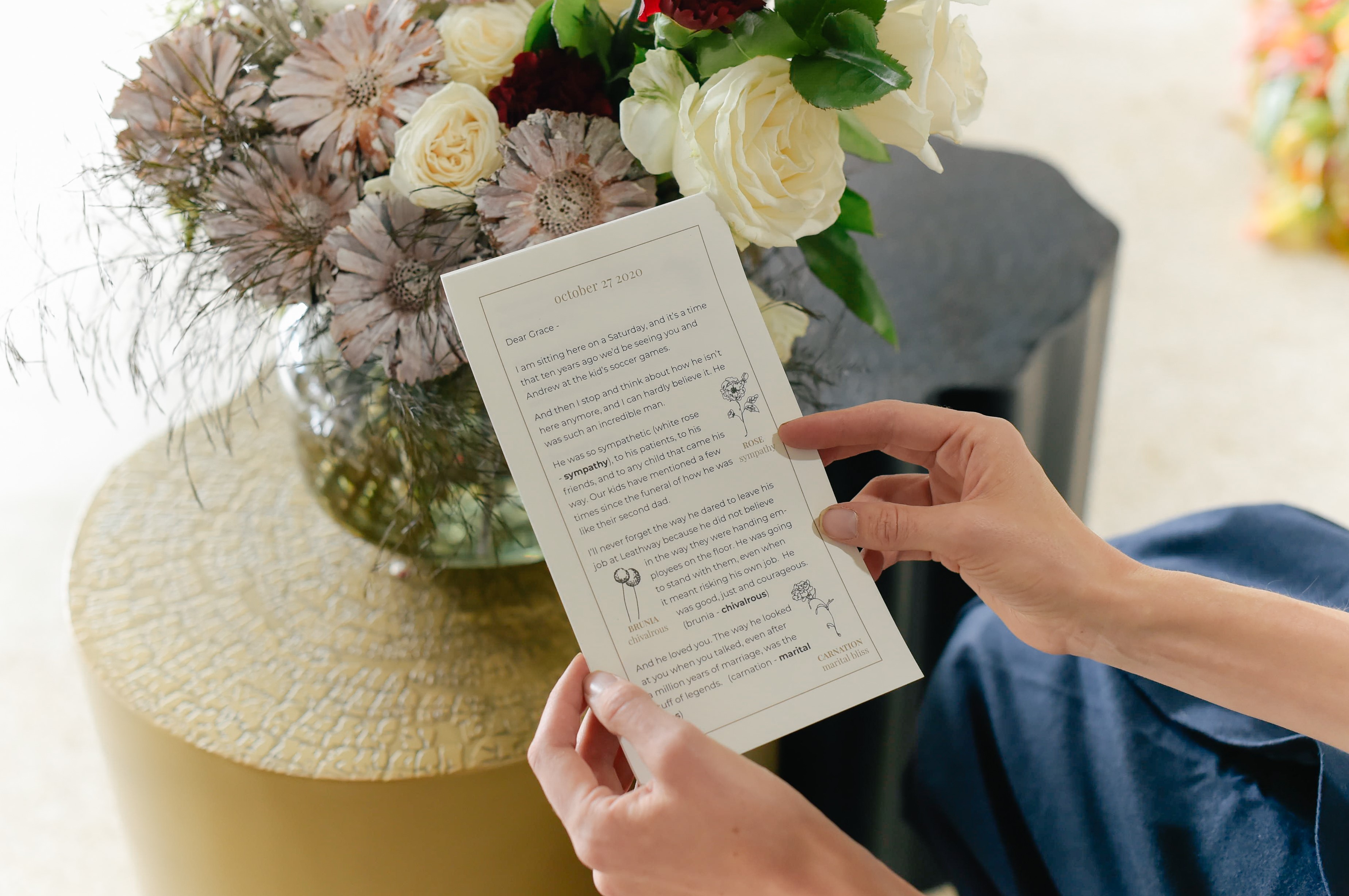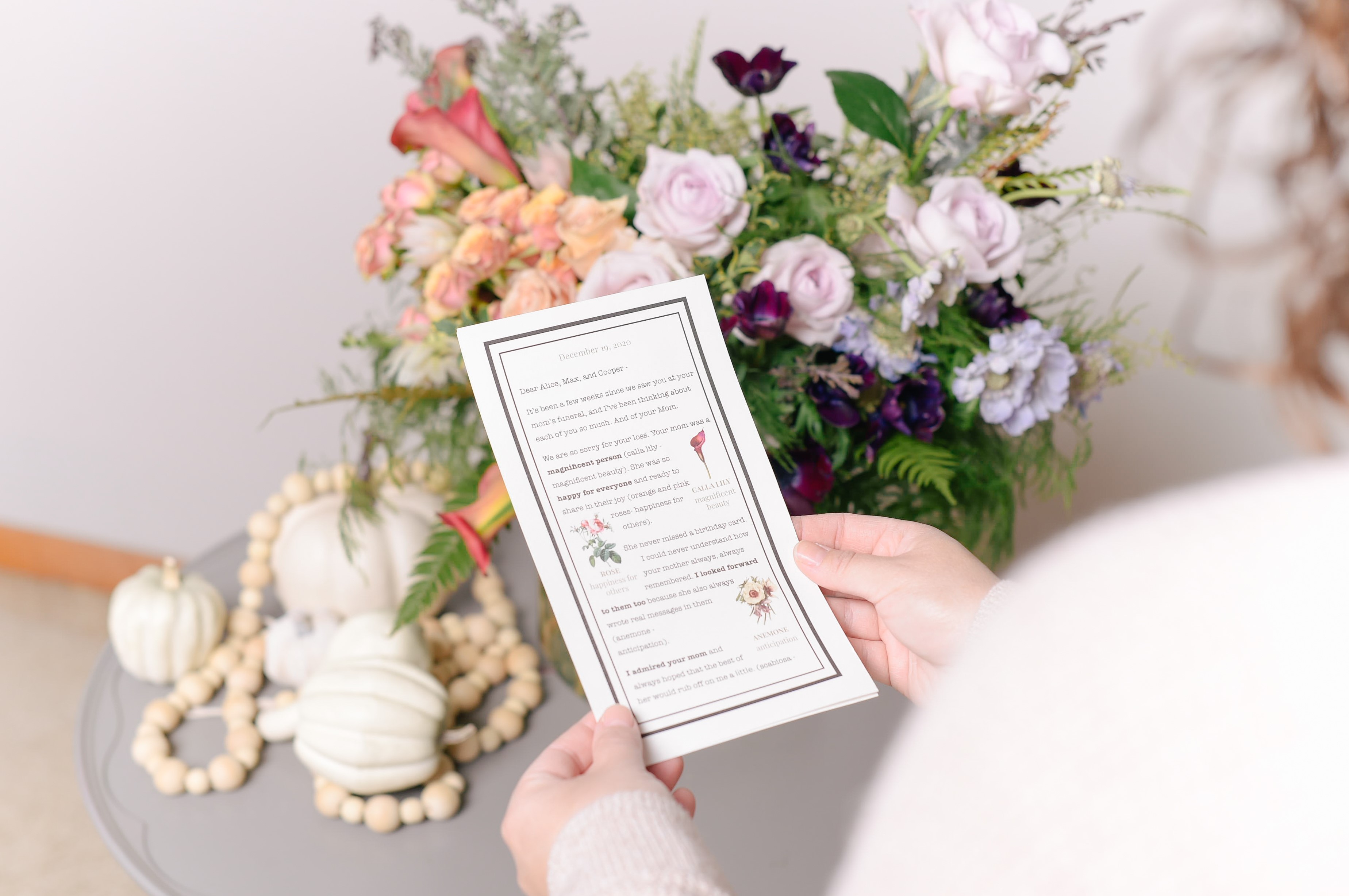In 2013, scientists shared a discovery they’d made at a burial site of Natufians, the earliest prehistoric people believed to systematically bury their dead. In these graves, found on Mount Carmel in Israel and dating from between the 13,700 and 11,700, scientists found that a number of the dead had been buried on a literal bed of flowers. This discovery answered a longstanding question of when humans started connecting flowers with the ritual of burial: from the beginning: turns out, we’ve been doing it from the beginning.
In recent years, the idea of having flowers at funerals has shifted. Indeed, we even now use the phrase “in lieu of flowers.” But before we move away from this way to honor someone’s passing, perhaps we should stop and ask why we include flowers in the first place?
In losing the flowers, though, are we losing something more? Why do we include flowers at times of funeral? Are they really needed?
Over the last 20 years, new research has shown that perhaps flowers are more than something people have always done (and perhaps shouldn’t do anymore). Rather, it’s possible that they play a unique and important role in how we grieve and heal.
Flowers help us heal faster
 According to a study done by Seong-Hyun Park and Richard H. Mattson from the Department of Horticulture, Recreation and Forestry at Kansas State University, people recovering from surgery healed faster and better when in the presence of flowering plants. Those with plants had better physiological responses, less anxiety and fatigue, and overall better recoveries. Of those who had flowering plants in their rooms, 93% said it was the most positive part of their room. Of those who didn’t, 91% said it was the television.
According to a study done by Seong-Hyun Park and Richard H. Mattson from the Department of Horticulture, Recreation and Forestry at Kansas State University, people recovering from surgery healed faster and better when in the presence of flowering plants. Those with plants had better physiological responses, less anxiety and fatigue, and overall better recoveries. Of those who had flowering plants in their rooms, 93% said it was the most positive part of their room. Of those who didn’t, 91% said it was the television.
The trauma of losing someone involves many of the same experiences as a surgical loss or change. This research indicates that the presence of flowering plants can provide a way to pull individuals from isolation into an interactive and healing experience.
Flowers help with isolation and loneliness
In a study out of Rutgers, the researchers found that flowers gifted to the elderly elicited positive mood improvements and improved episodic memory. When gifted once, depression and loneliness improved in 50% of the cases. When gifted twice or more, this went up by 80%.
No one is entirely sure why this happens. The author writes:
“Flowers have immediate and long-term effects on emotional reactions, mood, social behaviors, and even memory for both males and females. There is little existing theory in any discipline that explains these findings. We suggest that cultivated flowers are rewarding because they have evolved to rapidly induce positive emotion in humans, just as other plants have evolved to induce varying behavioral responses in a wide variety of species leading to the dispersal or propagation of the plants.”
When you think about the grief cycle and the many ways it can revert into debilitating depression and loneliness, you begin to see that throughout human history, flowers may have played an important role in how we live, love, and face losing those we love.
Flowers make us smile (which helps with grief)
In that same study out of Rutgers, the researchers discovered something else: that when gifted as a surprise, an enormous number of the recipients (100% of individuals identifying as women) gave the Duchenne smile. Researchers know this smile as the most authentic smile, the smile of pure joy. We know it as the smile given by babies to their moms.
Why is this important? Floracracy surveyed Americans’ beliefs and preferences about flowers and letters at times of grief. We found that what they want to hear most, in almost every age category, is funny stories about those who had passed. People want to laugh. This cognitive dissonance of laughter at a time of grief is beneficial for healing, even when shared through writing, such as a personal letter. Indeed, in research conducted by trauma expert George Bonanno, “those who exhibited genuine smiles and laughs while grieving, displayed less grief over time and evoked positive emotions in others.” The impact of funny, positive stories can change how some experience grief.
Further, positive psychology researcher Sarah Francois-Poncet explains in her capstone research project "When Words Matter Most", that “sharing positive words at times of pain trigger the positive behavior as seen in positive psychology: action over inaction, meaning over despair, resilience over hopelessness.”
Based on this research, gifts that combine writing with flowers might just well be one of the most powerful things you can do for someone at a time of grief.
Rethinking the role of flowers
For some, flowers at funerals may be a bit of a “thing you do” and not something people genuinely want. But does it have to be? And more importantly, when considering the above, should it be? Perhaps there is a way within this tradition to better help serve families in their journey through grief.
Wrap up a few flowers to take home
 Most floral arrangements are not designed to live outside a funeral home. They face forward or are set on wires. They are large. Most are not intended to last more than a few hours. Unfortunately, those hours are not a time when the grieving family can sit with them and feel their benefits. Consider adding a service where you wrap up a few of the stems in tissue paper with a letter from your team and give it to the family at the end of the service. Better yet, when you can, deliver it a day or two later to the home. This does two things. First, the gesture will allow them to experience the healing impact of the flowers in their own space and time. Second, your actions will provide support at a time of difficult transition. It will set up the process for an after-care support program.
Most floral arrangements are not designed to live outside a funeral home. They face forward or are set on wires. They are large. Most are not intended to last more than a few hours. Unfortunately, those hours are not a time when the grieving family can sit with them and feel their benefits. Consider adding a service where you wrap up a few of the stems in tissue paper with a letter from your team and give it to the family at the end of the service. Better yet, when you can, deliver it a day or two later to the home. This does two things. First, the gesture will allow them to experience the healing impact of the flowers in their own space and time. Second, your actions will provide support at a time of difficult transition. It will set up the process for an after-care support program.
Share the deceased’s favorite flower
In our survey on grief, we found that those who are grieving love to receive a certain kind of bouquet: ones that include the deceased’s favorite flower. Consider sharing the favorite flower and then providing a way for family and friends to send those flowers to the funeral home or else to the family after the funeral.
Meaningful moments in virtual situations
As individuals prepare for masking and avoiding group settings again, funeral home leaders may be asked to find unique ways to help families honor those who have passed. Flowers can be a powerful way to connect people when they are not together. Here are some ideas:
- Close family members who cannot attend receive meaningful arrangements, such as the deceased’s favorite flower or something that captures the person’s spirit, along with a special letter. This allows them to have something near them even when physically absent.
- The family could create virtual floral experiences shared with everyone, especially those who cannot attend.
- Family and friends who are absent can send letters and flowers to the home, especially over an extended period.
As the funeral space moves into taking a deeply holistic approach to supporting families, rethinking flowers might be a powerful way to set apart your business and better serve your customers. The shift across all sectors to personalized services opens the door for innovation and opportunity in a truly authentic way. Even through the tears, it may inspire the most genuine of smiles.
Sarah-Eva is the founder and CEO of Floracracy, the first online flower company working to redefine how consumers engage with purchasing and receiving flowers. Believing in a world where more people get to cry disbelieving tears of gratitude over a letter full of positive stories about them and those they love; the company delivers VESSELS across the US: beautifully written letters paired with uniquely styled premium floral arrangements.

